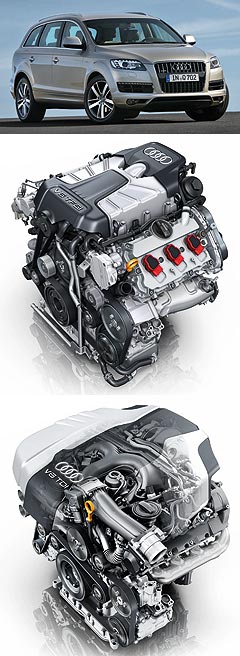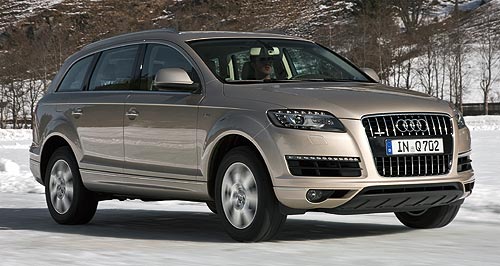New models - Audi - Q7 - 5-dr wagon rangeFreshened Audi Q7 offers more performance, efficiencyMore efficient: Audi’s big Q7 gets a raft of efficiency upgrades for 2011 – but no V8 petrol engine. Supercharging and idle-stop among fuel-saving measures for Audi’s SUV flagship16 Sep 2010 IT IS SAID there is no replacement for displacement, but Audi has again proved otherwise by coaxing more performance out of its revised large luxury SUV, the Q7, while significantly lowering fuel consumption, CO2 emissions and - in the case of its sole petrol variant, engine capacity. The Q7’s outgoing 3.6-litre V6 and 4.2-litre V8 petrol models have been dropped in favour a single 245kW 3.0-litre supercharged V6 with TFSI direct injection, which is also found under the bonnets of the Ingolstadt-based manufacturer’s hot S4 and S5 Sportback and Cabriolet models – as well as Porsche’s new Cayenne S Hybrid. In fact, the facelifted four-variant Q7 line-up arrives amid a rash of new or upgraded SUVs in Australia this year, including BMW’s facelifted X5 and Porsche’s all-new Cayenne in mid-2010 and next year’s next-generation Volkswagen Touareg, which is closely related to the new MkII Cayenne and Audi’s eventual Q7 replacement. Priced at $93,814, the mid-range Q7 3.0 TFSI’s blown V6 matches the 440Nm torque output of the petrol V8 in the discontinued 4.2 FSI ($122,514) and is just 12kW down in the power stakes. Nevertheless, acceleration to 100km/h is down from 7.4 seconds to 6.9 seconds and fuel consumption drops considerably from 13.3 to 10.7L/100km. That also beats the fuel figure of the old 206kW 3.6-litre V6 in the 3.6 TFSI that previously opened the range at $86,814, and which consumed 12.7L/100km and emitted 304g/km of CO2 - compared to 249g/km for the smaller, more powerful supercharged motor. Audi now joins BMW in offering diesel with for its entry-level large SUV and at an unchanged $88,614 the 3.0-litre V6 TDI variant remains almost $3500 cheaper than the recently-launched X5 xDrive30d ($92,100) – not to mention the $104,500 Cayenne TDI. The new Audi diesel engine’s improvements over its predecessor include reduced internal friction, a more accurate 2000-bar diesel injection system and idle-stop functionality, making it Audi’s first automatic model to have this feature. Owners of the cheapest Q7 will save time as well as money, as the 3.0-litre diesel trims a whole second from the previous model’s 0-100km/h sprint, to a sporty 7.9 seconds. Engine weight is down 20kg and power is up 5kW to 176kW, with torque leaping from 500 to 550Nm, trumping the BMW’s 173kW and 520Nm. Fuel consumption is down a big 19 per cent, from 10.4 to 7.9L/100km, with the CO2 figure dropping from 239 to 205g/km. However, this is where the Bavarian brand fights back with the xDrive30d offering slightly better economy and CO2 figures of 7.4L/100km and 195g/km respectively. Audi’s new oil-burner is shared with the cayenne and upcoming Touareg and employs separate cooling circuits for the cylinder block and head. This enables the lubricating oil to reach operating temperature more quickly and saves energy while the engine is under light load – effectively making the block air-cooled unless liquid-cooling is required. The 4.2-litre V8 TDI (unchanged at $127,814) also gains a 2000-bar injection system and has been worked over to reduce friction, resulting in a seven per cent improvement in fuel consumption - down from 11.1 to 9.2L/100km. It maintains its 250kW output and increases torque from an already-healthy 760Nm to a mighty 800Nm, a figure eclipsed by few vehicles in Australia other than some V12-engined AMG Mercedes-Benzes and Audi’s own Q7 V12 TDI, all of which punch out 1000Nm. Again, Audi has achieved an impressive drop in CO2 emissions with the revised unit emitting 242g/km against the previous version’s 317g/km.  From top: Audi Q7 3.0 TFSI, Audi 3.0-litre TFSI engine, Audi 3.0-litre TDI engine. From top: Audi Q7 3.0 TFSI, Audi 3.0-litre TFSI engine, Audi 3.0-litre TDI engine.Audi Australia managing director, Uwe Hagen, said: “The new engine range for the Q7 clearly demonstrates Audi’s commitment to progressive performance through the obvious results of our constant search for increased efficiency matched to improved performance. “Combined with the impressive power and efficiency increases these revised engines deliver, the Audi Q7 is clearly positioned at the head of the premium SUV class.” All models bar the $254,814 V12 TDI flagship, which remains unchanged, gain the eight-speed automatic gearbox that debuted with the new A8 limo. Featuring a tiptronic semi-automatic mode (with steering wheel paddles standard on the 4.2 TDI), lower transmission losses and a wider spread of gear ratios, the new transmission contributes to the Q7’s improved acceleration and fuel consumption figures. Audi claims that this gearbox alone lowers fuel consumption by about five per cent. “We continue to deliver the comfort, flexibility and practicality of a full size SUV, without sacrificing driver responsiveness and satisfaction,” said Mr Hagen. In other markets, the Q7 has two additional engine choices consisting of another 3.0-litre TFSI V6 in 200kW low-blow tune and an EU6-compliant 3.0-litre TDI ‘clean diesel’ with lower NOx but interestingly, higher CO2 emissions and slightly slower acceleration over the standard version, despite identical power and torque figures. The new supercharged petrol Q7 scores three stars in the Australian government’s Green Car Guide, making it the ‘greenest’ Q7, whereas the highest-scoring model of the old engine line-up was the 3.0-litre TDI with 2.5 stars. Audi is enjoying a 22.6 per cent increase in sales year-to-date compared to this time last year with 9272 cars registered in Australia, including 2502 SUVs and 737 Q7s. The newer and smaller Q5 has been far more successful for Audi in Australia this year, with 1765 sales making it 97 per cent more popular than in 2009, while Q7 sales are down almost 14 per cent. BMW remains the dominant player in the fragmented luxury SUV arena (and will release the new X3 here in early 2011), with the X5 attracting a 12.2 per cent share of the segment, ahead of the Q5 (11.0 per cent), the Lexus RX (10.4 per cent), Mercedes-Benz M-class (10.1 per cent), Land Rover’s Discovery (7.3 per cent) and BMW’s new X1 (7.2 per cent).
 Read more12th of April 2010  First look: Audi re-engines Q7V8-replacing supercharged V6 and eight-speed auto for Audi’s upgraded Q7All new models Alfa Romeo Alfa Romeo Abarth Abarth Audi Audi Aston Martin Aston Martin BMW BMW Bentley Bentley Chrysler Chrysler Chevrolet Chevrolet Dodge Dodge Citroen Citroen Ferrari Ferrari DS DS Ford Ford Fiat Fiat FPV FPV Foton Foton Haval Haval Great Wall Great Wall Honda Honda Holden Holden Hyundai Hyundai HSV HSV Isuzu Isuzu Infiniti Infiniti Jeep Jeep Jaguar Jaguar Lamborghini Lamborghini Kia Kia Lexus Lexus Land Rover Land Rover Mazda Mazda Maserati Maserati Mercedes-Benz Mercedes-Benz McLaren McLaren Mini Mini Nissan Nissan Mitsubishi Mitsubishi Peugeot Peugeot Opel Opel Proton Proton Porsche Porsche Renault Renault Ram Ram Saab Saab Rolls-Royce Rolls-Royce Smart Smart Skoda Skoda Subaru Subaru SsangYong SsangYong Tesla Tesla Suzuki Suzuki Toyota Toyota Volvo VolvoQ7 pricing
Motor industry news |
|
||||||||||
















Facebook Twitter Instagram